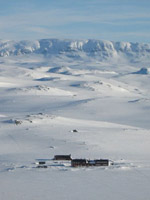Opening & keynote
The conference was opened by the mayor of Leeds, a reverent adorned with an impressive official chain, who referred to the multi-cultural character of Leeds as the third biggest city in the UK. Then, the conference co-chair John Cook introduced the keynote speaker Miguel Brechner, the project leader of the Uruguayan One-Laptop-per-Child project Ceibal. He held a very inspirational talk about the project in which all Uruguayan children in the state school system (some 450.000 kids in primary and secondary education) were given a laptop that is connected to the Internet (99%) both in school and at home. This video he showed, gives a good impression of the project. Others - such as the ever productive Steve Wheeler - have blogged about this session. My major lesson from the session was:
- This kind of project is not about ICT or infrastructure, it is about social change, about teacher training, about social support mechanisms, about political will and endurance.
- Access to Internet is fast becoming the major factor in education. As Brechner forcefully stated: "The Ceibal project transformed access to computers and broadband Internet from a privilege to a basic human right.
- What can we learn from this, and why can't we offer the same broadband coverage in our part of the world? Some UK colleagues asked a question during the session, about how they could help the people in Uruguay to further this project. Somehow this question felt wrong (as noted by others). It's more: what can we (in the 'civilized' developed countries) learn from this? One thing I feel is that it should not be left to commercial providers alone to get everyone 'connected'. Miguel even mentioned rural areas where the laptops and broadband arrived before electricity did!
- Access to Internet means access to social media. I and others wondered how the kids were using their access to Internet to get to social media. Interestingly Miguel asked: "What is social media?" He then said: "Well, they're all on Facebook", which left me wondering whether their use of Facebook is similar to the way my kids are using it.

No comments:
Post a Comment